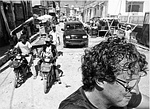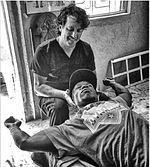Some Hands-On Help for Haiti
Palisades resident Ed Kalotkin is no stranger to adventure. In his twenties he worked as a guide for an upscale expedition company. He’s kayaked in Alaska and hiked Machu Picchu, but this May when his plane touched down in Port-au- Prince, Haiti, he looked out at the devastation of a failed state and wondered if he’d gone too far.
As a first time volunteer for Phoenix Rising for Haiti (PRH), Kalotkin was prepared for a week of hard work, but sweating through the light blue Phoenix Rising for Haiti T-shirt he’d been told to wear, Kalotkin scanned the airport for anyone wearing the same shirt and put on sunglasses to hide his panic.
He tried to forget the State Department’s warning of kidnappings, robberies and murders of U.S. citizens in Haiti. “Everyone had this look like they were waiting for something…it was a look of hopelessness,” he said when we met in July to talk about his trip.
Kalotkin, 43, is a certified orthopedic manual physical therapist. He needs only a flat surface and his hands to relieve pain caused by injury to muscles, tendons and ligaments. It’s as low tech as physical therapy gets and that’s exactly what PRH is looking for. Founded by orthopedic technician Billy Abril in 2010, twice a year PRH rents a two-story house in Haiti’s fourth largest city, Port-de-Paix and opens a free clinic. For one week, in relentless heat and humidity, around 15 volunteer physical therapists, prosthetic technicians and orthopedists see patients from 7:00am to 7:00pm. With rough wooden tables as examination beds, the volunteers use their professional expertise to give whatever relief they can.
“At 4:00 in the morning you hear people lining up,” said Kalotkin. He estimated there were hundreds with back and neck pain, bone injuries, open wounds and in need of prosthetics. Some waited as long as 12 hours to be seen.
Physically drained by the end of each day, Kalotkin said the gratitude of the patients changed his attitude about life and work. He was reminded of how fortunate he was. “I felt they’d be happy to get whatever we could give,” he said. In one instance that meant teaching a family how to care for a relative paralyzed by a stroke. In another it was fashioning a brace for an 18-year-old girl with a badly healed broken foot. Small fixes by American standards, but for these patients they were everything. “I can never complain again,” says Kalotkin.
Kalotkin plans on volunteering for PRH next year. He said it keeps him positive about his profession. More importantly, he’s proud his two young sons know their father can use his skills to help people in serious need.
For more information about PRH http://phoenixrisingforhaiti.org/index.php/about-us



